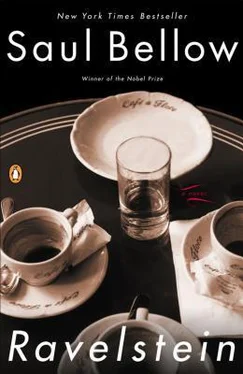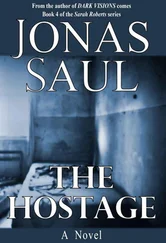"And as a special treat…" Rosamund held up the slick colored travel literature-sunny beaches, wooded hilltops, palm trees, native fishermen. A Caribbean holiday was what she was proposing. We'd unpack in Boston and dump the cardboard boxes in which our goods were packed. Then we'd fly to Saint Martin via San Juan. There we'd float idle, dream in the warm sea, recharging our vital batteries.
"Where did you get all that glamorous travel propaganda, Rosamund? Saint Martin, eh? Isn't that where the Durkins go?"
"Never mind. They're good friends. They can see exactly what you need."
"The West Indies will strip away all those layers of stress, and suddenly I'll be restored, and well and strong enough to write the Ravelstein memoir."
"I'm not suggesting a working holiday," said Rosamund. "I sup pose you've been in the Caribbean."
"Yes."
"And you don't like it? "
"It's one huge tropical slum But I go mostly by Puerto Rico. Big gambling joints, a huge smelly lagoon, dark and muddy-un happy welfare-looking native crowds. Then the Europeans arriving in charter flights. And what they carry home with them is the feeling that the Americans have made a mess of things and that Castro deserves the support of independent intelligent Scandinavians and Dutchmen."
But in the end Rosamund had her way. I discovered, however, in the early days of our marriage that, in having her way, she put my interests ahead of her own. The Durkins recommended a small apartment on the beach. The baggage was checked through-all the summer rags, papers, swimsuits, sunscreen, sandals, bug repellents. San Juan seemed more glamorous, around the seashore at any rate. We had time to kill between flights and we killed it at the bar of the grand hotel. There we sat beside a hard-drinking American who told us that his wife had been struck down by an unidentified disease. This man said that he commuted between Dallas, where he owned a business, and the great industrial-sized San Juan hospital where she was being treated. For some weeks she had been unable to speak, perhaps to hear-who could say. She was unconscious. She wouldn't, perhaps couldn't, open her eyes. "She don't respond. I feel like a damn fool, talking at her."
When our bus was ready, we left him at the bar. He looked a lot like a red sandstone bluff with an overhang of bleached grass. Rosamund couldn't bear to abandon him, so miserable-she is like that. But he didn't answer our goodbyes.
About half an hour later, landing in Saint Martin, we passed through the immigration hangar, a vast Quonset hut of corrugated green metal-everything in the tropics seemed to me to have a pro visional character. Before an official counter under sizzling lights we lined up to pay a fee and have our passports stamped. Then we got into a cab and were driven to the French end of the island. Our landlady was short with us because we had kept her up so late. A little after we had gotten into bed a furious man arrived, kicked and punched her door, screaming that he would kill her. I said, "If the security-chain doesn't hold this may end in murder." But the cops came in a car with a flashing lamp on the roof and took him away.
"What do you think?" said Rosamund. I remember saying that this might be normal for the climate. Gorgeous but unstable.
I refused to be captivated by the place. Maybe it was old age. I used to be a cheerful traveler but now I sniff at the linen when I lie down. Here I scented the detergent powder in the sheets and pillow cases, and the septic tank beneath the bathroom.
But we woke to a clear tropical morning with lizards and roosters. On the ocean, straight in front of us the yachts towed their dinghies. Planes at the airfield took off and landed. But the beach was fine, firm, broad, with a border of trees and flowering shrubs, and there were crowds of yellow moths traveling. On the inland side of the house there was a rich tree, heavy with a crop of limes. Behind was a steep hill.
For our morning coffee we walked to the far end of the main street. French of a sort was spoken in the bistros and bakeries. We sat on the _terrasse__ taking in the sights. What was there to see here? Or to do? To begin with we'd buy the daily essentials. Then we'd swim. Waves were seldom seen in the bay. You could float on your back by the hour, or lie drying in the sand. Also, you could stroll along the waterline and inspect the topless women-sunning or exhibiting their breasts. Being natural, I suppose. But the eyes of these women informed you that if you spoke to them, they would not answer.
By the time we walked back, the lunch spots were opening. Ribs, chicken, and lobster were offered at about twenty grills that were crowded together, with flames spurting straight up, more flame than you needed for sensible cooking. Each and every joint had its own grinning tout, shouting, laughing and holding up live lobsters, swinging them by the antennae or the tail. If some part of the creature fetched loose and fell to the ground, that was part of the fun.
"Let's get away from this," said Rosamund. She complained about the barbecue smoke. It made her eyes smart. But what she couldn't bear was the torture of the lobsters. Back in New Hampshire when she saw salamanders in the road she picked them up and carried them to safety. I would say, "They may not want to be where you put them." It was wrong of me to tease her for her humane impulses. Tender-mindedness is an uncomfortable problem for all parties. The tender-minded leave it to the less feeling to say, "It's the law of life. We must eat. And aren't the crustaceans themselves cannibalistic?" But all this is evasion. You sprinkle your "interpretation" with schoolbook science. Do these armored lobsters regenerate the claws they lose? This seems to be why we have science classes, as a cover for our heartlessness. Or to refine it, at least. Polonius is at a dinner, not where he eats but is eaten by worms-the payoff for a lifetime of dinners.
You can't apply your humane tape measure to any effect. Before you can fend them off your dead suddenly have surrounded you. What would Ravelstein have said about this? He would have said, "Girlish queasiness." Meaning, perhaps, "She is a tender-minded human being and must work things out for herself. Such a matter has to be thought through by every adult. As for the red salamanders, perhaps they could go into a spaghetti sauce…."
On Saint Martin we were at the lower-eastern-end of the bay, in a two-story house. Below us a tourist family from the North of France took over the garden. They were _en famille__ while we had no special need of it. It was the beach that interested us, just beyond the low wall. We were about thirty feet from the water's edge. A glass-bottomed boat took tourists on a regular schedule to the coral reef just to the north.
I was grateful for the bay. It gave us an enclosure. I am thankful for boundaries. I am fond of having the lines drawn around me. I wasn't here to battle the seas but to swim and to float quietly. To open my mind to Ravelstein. Often Rosamund towed or carried me in water just shoulder-high. She put her arms under me and walked back and forth. She was not a strong young woman-she didn't have to be. Sea water seems more buoyant, you don't have to work to keep afloat, as you would in a lake or pond. Rosamund is slender in build, not skinny, not abrupt. She wears her brown hair down to the shoulders. It's like a limitless asset. Her long eyes turn out to be blue, not the brown her dark hair would lead you to expect. The music she sang as she sailed my body through the water was from Handel's _Solomon__. We had heard it in Budapest a few months earlier. "Live forever," she sang. "Happy-happy Solomon." This chorus sung by her single voice had the rustling sea water under it. Lying on her forearms I saw the moths, pale yellow in slow spinning clusters of hundreds. This must have been breeding time for them. And over the main drag was a cloud of barbecue smoke, and the touts, the children of Belial, laughing blinded by the sun would be swinging live lobsters by the antenna to tempt the tourists.
Читать дальше












